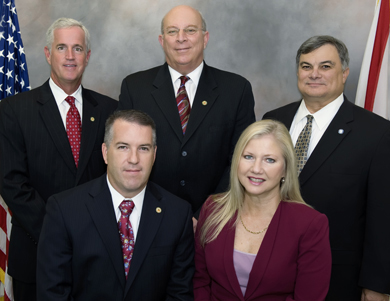The Wellington Village Council last week decided to divest itself from the Wellington Community Foundation and put it in the hands of private citizens appointed by council members.
Following their agenda review meeting on Monday, Dec. 8, council members continued the annual meeting of the foundation from Nov. 11 to discuss the nonprofit’s future.
The foundation was created in 2009 as a private nonprofit to raise money through donations for capital projects, but subsequent inspector general opinions have hamstrung its operations, because council members, who sit as the foundation’s directors, can no longer use their elected position to benefit private organizations.
Assistant Village Attorney Megan Rogers offered the council several recommendations to fix the problems: outsource the foundation to a council-appointed executive director, dissolve it and shift its $50,000 balance back into the general fund and continue to solicit funds as council members under a Code of Ethics exemption, or appoint an advisory board similar to other existing advisory boards, although they also would be prohibited from using their position to solicit donors.
Vice Mayor John Greene said there had been concerns about an independent advisory board because the council would have to relinquish all authority to a private group.
“At that point, they can adopt new bylaws and revise things however they want,” Greene said, “but to serve as private citizens using the brand of Wellington for philanthropy throughout the community. There’s no conflict with them because they’re not necessarily sitting as a committee member where they’re part of our government entity.”
Rogers said there would be financial and technical requirements to resolve in order to separate the foundation as it currently stands as a support organization for the village, in order to rectify the ethics concerns.
Councilwoman Anne Gerwig had concerns about private citizens’ ability to solicit money because they would be appointed by council members.
Rogers said there would be no conflict because it would be a one-time appointment and would not be an ongoing body established by the council.
Greene said they would be able to solicit because they would not be considered advisory board members.
“We can’t have any say in what they do, what dollars should be allocated, what their terms would be, whether we like them, we don’t like them,” Greene said, adding that the length of their terms would also be up to them. “They appoint their chairpersons, and it’s completely on them.”
Councilman Howard Coates said with most nonprofits, the reappointments are handled by the boards themselves because there are no shareholders to elect them.
Greene turned to the unresolved discussion about allocation of existing funds, which were generally not earmarked, except for about $5,000 for the Patriot Memorial and $5,000 for Scott’s Place playground.
“There’s so many great charitable things that go on in this community, to have the right people in place that could create the right exposure and tap into their influence to be able to raise money and then to be able to earmark certain projects, and you can restrict some funds and contributions,” he said. “That’s probably some latitude that we wouldn’t have if we just kept it going the way that it is.”
Coates said he favored keeping the foundation intact but divesting from the council because members’ hands are tied in terms of what they can do with the foundation.
“I agree with you,” Coates said. “I think the name is a nice force for a private group that would want to take over fundraising for charitable organizations for this community.”
Coates also favored appointing board members who would decide how they are going to appoint an executive director.
Gerwig was concerned that the original purpose of the foundation was to raise money for capital projects, and the council has the ability to do that. “Are we creating a situation where we are competing with the Wellington Community Foundation for projects that we want to be involved in?” she asked.
Coates said the council has not been very effective as a fundraising organization. “The short answer is, yeah, we are competing, but we really aren’t big on going out and seeking charitable fundraising to begin with,” he said.
Mayor Bob Margolis said that although the council is allowed to fundraise for the village itself, he thought it could draw perceptions of a conflict.
“My opinion is I’m not going to do that,” Margolis said. “If we had a board to do it, I’d feel comfortable for them to do that.”
Greene agreed that council members had not been actively fundraising for capital projects.
“We all have busy schedules, and to add another layer of responsibility to raise money for capital projects, I don’t think it has been done,” he said.
Gerwig made a motion for the council to divest the foundation from Wellington government and to give each council member 45 days to appoint someone to replace them, pending IRS approval. The motion carried 4-0 with Councilman Matt Willhite absent.








